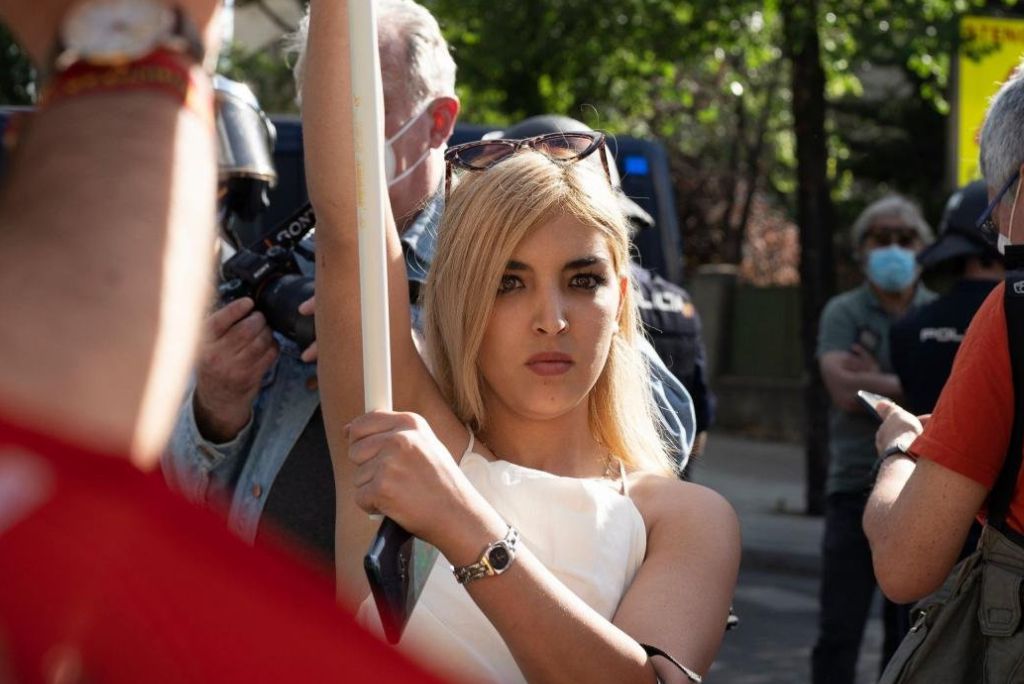Spain has sentenced 21-year-old nationalist activist Isabel Peralta to one year in prison for daring to voice concerns about mass immigration.
Her crime? Speaking out at a 2021 protest in Madrid, where she declared, “Sufrimos una suplantación racial sin precedentes” (“We are suffering an unprecedented racial replacement”) and shouted “¡Muerte al invasor!” (“Death to the invader”).
For these words, Peralta was convicted of hate speech in April 2025, slapped with a €1,080 fine and stripped of voting rights—a chilling message to conservatives that dissent comes at a steep cost.
ADVERTISEMENT
RECONQUISTA pic.twitter.com/Lbf66cESXQ
— Isabel Peralta (@Ysabelmperalta) April 13, 2025
The backdrop was a tense diplomatic clash with Morocco, as thousands of migrants flooded into Ceuta, overwhelming Spain’s borders. Peralta, then tied to the now-defunct nationalist group Bastión Frontal, joined a rally outside the Moroccan Embassy to protest what she saw as a failure of government policy.
Her fiery rhetoric captured the frustration of many Spaniards who feel their cultural identity is under siege. Yet, rather than engage with her critique, the Spanish state chose to silence her, wielding vague hate speech laws to criminalize political speech.
The Madrid Provincial Court’s ruling is a textbook case of selective outrage. Prosecutors claimed Peralta’s words incited violence against Moroccan immigrants, but her defense was clear: she was targeting disastrous open-border policies, not individuals.
22-year-old Isabel Peralta has been sentenced to a year in prison for “insulting the dignity of Moroccan immigrants”.
The “hate crime” charge stems from a 2021 protest during which she said that the illegal aliens flooding into Spain from Morocco constituted an invasion. pic.twitter.com/zCfZCheOw2
— Varia Skye (@SkyeVaria42423) April 16, 2025
The phrases “suplantación racial” and “muerte al invasor” were metaphorical, meant to rally support for national sovereignty, not to harm anyone. Even the court’s lighter sentence—sparing her the 3.5 years prosecutors demanded—feels like a grudging concession, with the possibility of suspension doing little to mask the verdict’s intent: to intimidate conservatives into silence.
Spain’s hate speech laws, enshrined in Article 510 of the Penal Code, are a slippery slope. They grant the state broad power to decide which opinions cross an invisible line, leaving room for political bias. While Peralta’s blunt language may offend some, it reflects a viewpoint shared by millions across Europe who worry about rapid demographic change.
Compare this to the leniency often shown toward inflammatory rhetoric from progressive activists or minority groups—slogans that vilify “the system” or call for upheaval rarely face such scrutiny. The double standard is glaring: one side gets a megaphone, the other a gag.
Peralta’s case exposes the fragility of free speech in Spain. By punishing a young woman for challenging the elite consensus on immigration, the state signals that only approved narratives are safe. Conservatives, already marginalized in a left-leaning media landscape, now face legal peril for speaking their truth.
The protest where Peralta spoke was chaotic, yes, but her words were no more inflammatory than countless political chants heard worldwide. To brand them as hate speech stretches the term beyond reason, turning dissent into a crime.
This verdict risks emboldening the censorship of other controversial voices. If Peralta can be jailed for metaphors about “invasion” and “replacement,” what’s next? Will debates on immigration, faith, or identity be off-limits unless they toe the progressive line?
Spain’s Constitution and Europe’s own human rights charters promise free expression, but cases like this reveal those guarantees as hollow when the state dislikes the message.
Conservatives must rally behind Peralta, not because her views are universally shared, but because her right to speak them is non-negotiable. Her appeal looms, offering hope to reverse this injustice, but the broader fight is clear: reclaim the freedom to debate without fear. Isabel Peralta isn’t just a defendant—she’s a warning. If Spain can silence her today, it can silence any of us tomorrow.
About The Author
Post Views: 122















